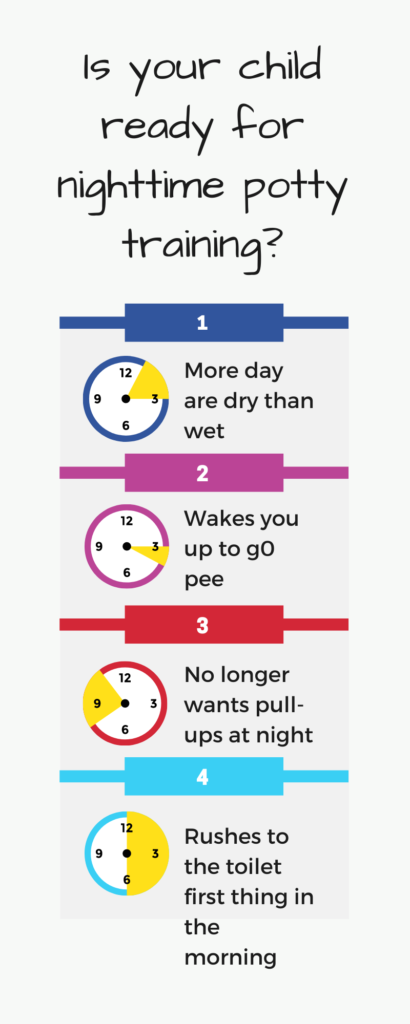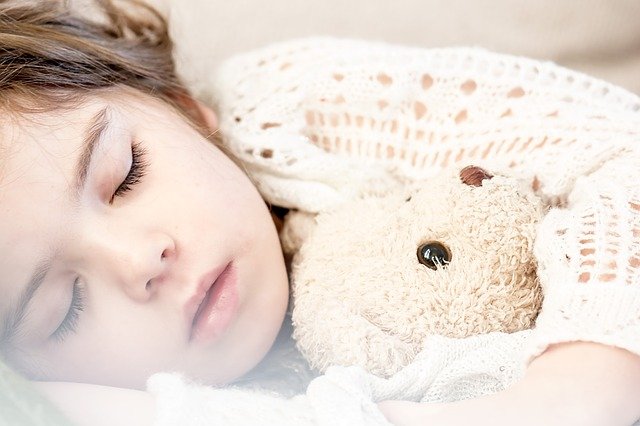Think your little one is ready to ditch the diapers and pull-ups for the potty seat? Potty training seems like a never-ending task, but once your child can go to the toilet independently during the day, it’s a cause to bring out the confetti to celebrate. It is a milestone, not only for your child but a significant achievement for the parent too.
However, nighttime potty training is a different ball game altogether. Because nighttime potty training is more of a physiological milestone than a behavioral one, it takes considerably longer for your child to achieve this milestone. Many children go well into their preschool years wearing a pull-up at night. While this is normal, there are ways you could help your child transition smoothly from the night pull-ups. This guide details everything you need to know on nighttime potty training and tips and tricks to help your child achieve this milestone.
Table of Contents
When do I know my toddler is ready to night potty train?
Guiding your little one on how to nighttime potty train is mainly dependent on their readiness. Starting before your child is ready could do more harm than good to the child. The first sign to guide their level of preparedness is to ensure that your child is consistently achieving daytime dryness. Yet, it is essential to keep in mind that every child develops differently. They can achieve daytime dryness but take a long time to be ready for nighttime potty training. Research shows that roughly 15% of 5-year-olds are not dry at night, and 10% of 6-year-olds require nighttime protection.
Other cues to look out for are:
- Your child’s pull-up is consistently dry each morning
- Your child wakes up to ask to go pee at night
- They are reluctant to wear a pull-up, or they remove the pull-up themselves in bed
- They rush to the toilet when they wake up in the morning to empty their bladder
If your child shows one or more of these signs, then it might be time to start night potty training.

How do I start nighttime potty training?
Many parents find this step the hardest and approach it with much trepidation. Yet, when you prepare yourself and your child mentally and physically, it takes the frustration and anxiety out of the picture. Talk to your child and explain to them what they need to do now that they no longer need pull-ups. Encourage your child by offering lots of praise and support on this milestone. If an accident happens, don’t be quick to react and make a big deal about it. Doing so could cause your child to regress. Try and make the nighttime potty training an adventure and let your child be excited about being a grown-up!
Get a mattress protector to save your mattress. Prepare yourself to deal with accidents because they will happen. Having a fitted mattress cover will save you the scramble of looking for alternatives in the middle of the night. You may also consider having disposable padded mats for them to sleep on. Dress your child in pajamas they can easily pull down when they need to use the potty. It will also be helpful when you have a set of pajamas and sheets nearby.
Ease the burden of your child having to rush to the toilet by placing a potty near the bed if your little one needs to use it in the night quickly. Have a night light in your child’s room to help your child find the potty or her way to the toilet when they wake up at night.
Finally, create a bedtime routine that requires your little one to go to the toilet right before bedtime so that it comes naturally to them even as you night train them.
Tips on how to nighttime potty train
Guiding your toddler on how to nighttime potty train needs you to be calm, positive, and patient. It is not as easy as day training. Still, you can rest assured that just as they are independently going to the toilet during the day, they will eventually achieve the night potty training milestone. It is only a matter of time. Here are some handy tips that you could try implementing for successful nighttime potty training:
1. Limit your child’s drinks an hour before bedtime
Ensure that your little one is well-hydrated during the day and, as bedtime approaches, control the number of drinks they are taking. This helps to eliminate the need to go to the toilet shortly after they have gone to bed. Some parents use smaller cups after dinner, so the amount the child drinks is not too much. Eliminate fizzy drinks or sugary drinks before bedtime, which tends to fill up the bladder more.
2. Make it a bedtime routine for the kids to go potty before getting into their beds
Having a routine even before learning how to nighttime potty train helps your little one develop this habit, which eventually becomes second nature, just like brushing teeth before sleep. If their bladder is empty before they sleep, they’ll be less likely to have an accident at night.
3. Teach your child to go to the bathroom anytime he wakes up at night
This may be frustrating for you, especially after a long day at work, and you have just settled into your sleep. But this will eventually pass, and your child will be sleeping completely dry all night eventually. Teach your child to wake you, or if they are comfortable going potty without you at night, then take their lead. The goal is to normalize going to the bathroom at night.
4. To wake or not to wake
Many parents are cautious with this approach, especially when you have toddlers who find it difficult to fall back asleep immediately once they are up. Other parents swear by this approach. This approach requires you to wake your child at night to go pee and take them back to bed. However, some experts suggest that this may encourage wetting the bed more as the child pees when they are half asleep and can cause more accidents. As a parent, you know what would work for your child better. If they fall asleep quickly, then you could try this approach.
5. Ensure they are no significant changes in the home during night time potty training
Learning how to nighttime potty train is a developmental achievement that needs your little one in a stable environment. Do not try to start potty training when planning to relocate or when going on a trip. Your child needs to maintain their regular bedtime routine for the nighttime training to be successful. Changes to your child’s environment could cause them to regress
6. Dress your child in pull-ups only when they are going to sleep at night
Potty training is a task that needs commitment and dedication. It becomes a success when you take a laid-back approach. Putting too much pressure on yourself and your child is counter-productive, and it could take longer for your child to achieve this milestone. When the accidents happen, and they will happen, take it in stride and continue to encourage your little one. If you feel your child is not ready, it is okay to go back to night nappies and try again after a few weeks.



